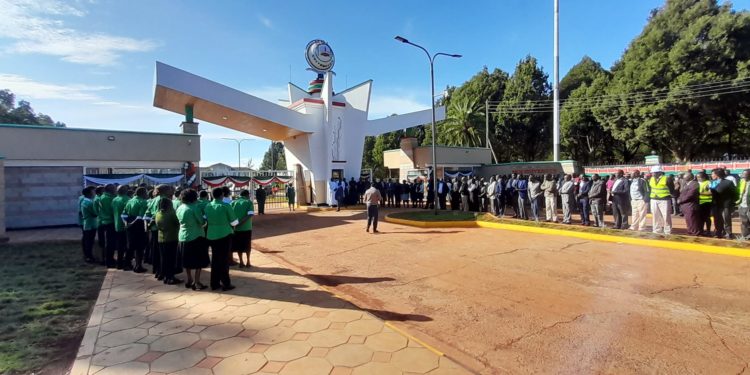The administration of Moi University is facing intense scrutiny following revelations of embezzlement linked to a KES 25 million gate project. Lawmakers questioned university officials over financial misconduct, including allegations of fraudulent banking practices, mismanagement of loans, and irregular construction activities, during a recent hearing before the Public Investments Committee on Education and Governance.
Members of the House Audit Committee expressed concerns over systemic fraud at Moi University that has eroded its financial standing and undermined service delivery. During a session chaired by Hon. Jack Wamboka, the university’s Vice Chancellor, Prof. Isaac Kosgey, struggled to explain a series of alleged financial malpractices that lawmakers say were orchestrated in collaboration with rogue staff and administrative officials.
At the heart of the inquiry was the university’s controversial decision to build a new main gate. The project, initially contracted for KES 4.8 million in 2017, was later abandoned, leaving an incomplete structure. The administration then tendered a second gate at a staggering cost of KES 25 million. When questioned by lawmakers, Prof. Kosgey cited the Kenya Rural Roads Authority’s (KeRRA) intervention as the reason for abandoning the first project, claiming the gate had been constructed on a road reserve.
“We were forced to abandon the first project because we were advised by KeRRA that the gate was on a road reserve,” Prof. Kosgey told the committee.
The university’s decision to proceed with a significantly more expensive gate after abandoning the initial project raised alarm among committee members, who criticized the waste of resources and raised further concerns about the institution’s overall financial management.
Unexplained Millions in Staff Welfare Accounts
The gate construction fiasco was only one aspect of the financial irregularities flagged during the session. Members of Parliament also questioned the university’s handling of student fees, highlighting fraudulent payments and questionable banking practices. The committee discovered that over KES 7.7 million intended for the Nairobi campus was irregularly banked into the Moi University Staff Welfare account instead of the institution’s designated accounts.
When asked to clarify, Prof. Kosgey explained that the funds had since been returned by National Bank and that the implicated staff members had been dismissed. However, his response failed to satisfy the lawmakers, who demanded to see the correspondence between the university and the bank for further verification.
“This report implies that Moi University and the educational system at large is characterized by fraud and corruption. The end result is, this breeds bad leaders, unqualified teachers, quack doctors, incapacitated managers, and corrupt public officers,” remarked Hon. Kaikai, a member of the committee.
Financial Woes at Rivatex
The session also delved into the university’s controversial involvement in Rivatex East Africa Limited, a textile firm acquired by Moi University through a KES 3 billion loan. Members of Parliament questioned the wisdom of investing in the loss-making venture, pointing out that the institution has been unable to generate income from the business while neglecting its infrastructure and student living conditions.
In response, Prof. Kosgey defended the investment, saying it was part of the government’s program to revive the ailing textile industry. However, MPs remained unconvinced, with many suggesting that the funds would have been better spent on improving the university’s facilities.
Other Financial Malpractices
Lawmakers also uncovered discrepancies in the university’s fee collection system, where an audit revealed KES 25 million in reversed credit entries in student accounts. The funds, paid through cheques, had been falsely credited to student ledgers before being reversed. The implicated staff member responsible for these entries was dismissed, but MPs criticized the administration for failing to pursue criminal charges.
“This was clearly a slap on the wrist. Dismissing the employee without pursuing legal action raises questions about the administration’s involvement in these fraud cases,” one MP noted.
The committee also found that the university had illegally engaged casual workers and appointed officers in acting capacities beyond the legally allowed time frames. Several key projects, including the Library Annex Campus and School of Dentistry, were delayed, with no approved extensions, further exposing the institution’s poor management.
Visibly frustrated by the numerous incidents of financial mismanagement, Hon. Wamboka assured that the committee would take decisive action.
“As a committee, we shall bring sanity back to our universities and prevent the misappropriation and misuse of university resources through fraud, theft, and embezzlement, among other financial malpractices,” he said.
Hon. Wamboka invoked Standing Order 191(a), fining Prof. Kosgey for his unsatisfactory responses. The Vice Chancellor was given two weeks to pay the fine and return to the committee with all relevant documents for further scrutiny. Failure to comply could lead to further penalties.

















